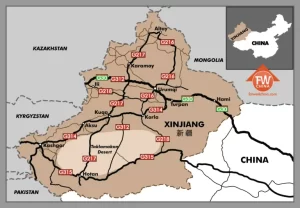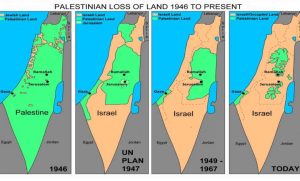This article compares the treatment of the Uighurs in Xinjiang (Eastern Turkestan) by the Chinese imperialist state with the treatment of Palestinians by the racist, apartheid Israeli state backed by western imperialism – US, UK and the leading EU powers. The author is a Chinese student with a partial Uighur background. This article was first posted by the International Marxist Humanist Organisation. It makes a contribution to those opposing a campist view of the world.
THE UIGHURS AND THE PALESTINIANS


Seeing the news about the October 7th attack by Palestinian militants under Hamas from Gaza into Israel, I hope to share my perspective from the special standpoint of a person of partly Uyghur descent coming from China and now studying in the United States.
Despite being of Uyghur descent, only my paternal grandmother is completely Uyghur in the sense of ethnicity. In the process of growing up, I was surrounded by Han Chinese and only visited Xinjiang during vacations. This writing is not for the purpose of confirming nor denying opinions from either side on matters of the Uyghurs and the Palestinians but instead is only for sharing what I have witnessed with my own eyes. As these two oppressed groups are often put on two different sides in the current global context, I wish to share some of my thoughts on their similarities.
My hometown is a small city named Bole in Xinjiang; it is so small that half an hour’s drive would be enough if not more than enough to take a tour of the entire city. Yet, in this inconspicuous city, armored vehicles are seen patrolling the street, men in uniforms holding machine guns stand in front of movie theaters, and security checkpoints are set in front of every mall in the region. A subdued atmosphere is created by the combination of those details, constantly reminding you that you are not free.
I have limited contact with my Uyghur relatives and have only seen them a few times during the holidays. Through conversations between the adults, I learned that they are forced to “become family” with a designated governmental official, who visits their house every few weeks or months. Despite only being a distant relative of Uyghurs, I have also experienced some frustrations because of my identity–such as being detained at the airport for two hours after being asked about my Uyghur relatives, or finding out that my father could not come to my college graduation ceremony in the United States because his identity doesn’t allow him to keep a private passport.
To me, the stories of the Uyghurs and the Palestinians are very similar; both are under decades of oppression with their freedom and living space gradually eroded. In these decades, they are continually resisting but are rarely seen, except for occasionally being brought to the fore by imperialist states from both sides to play their games of politics.
For those who are refraining from supporting the Palestinians and who are accusing those who do so of being anti-Semitic, I would like to say this: It is senseless to attribute Palestinian resistance entirely to Hamas or to blame the Israeli-Palestinian conflict entirely on terrorist attacks from Palestine, just like it would be unreasonable to deny the pain and oppression that the entire Uyghur population has faced for years because some individuals or groups took an extremist approach involving retaliation. Although we would never support such a form of extremism, I believe it is our responsibility to understand the reasons behind their actions, to look into their suffering and helplessness, and to reflect on the role of our wrongdoings or inactions in contributing to this tragic outcome.
I hope that we can let go of our prejudice, be dialectical as in don’t blindly support any side because of the self-knowledge of being on the side of the left or the right, and don’t refuse to see the sufferings and struggles of a population because of the actions of a few. Don’t see things through the lenses of state, religion, or ethnicity, but as people oppressed for decades fighting to be free.
24.10.23
_____________
also see:
Ukrainian Letter of Solidarity with Palestinian people
EL&SD Coverage – Looking at the world through non-campist lenses
